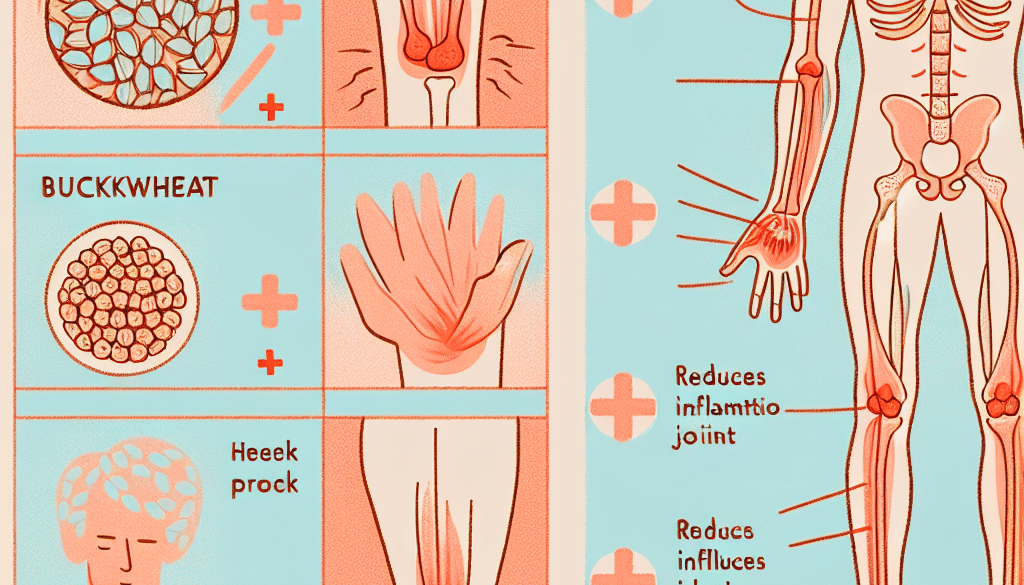Is Buckwheat An Inflammatory Grain?
-
Table of Contents
- Buckwheat: An Inflammatory Grain or a Healthful Choice?
- Understanding Buckwheat and Its Nutritional Profile
- The Inflammatory Potential of Grains
- Anti-Inflammatory Properties of Buckwheat
- Scientific Research on Buckwheat and Inflammation
- Case Studies and Examples
- Comparing Buckwheat to Other Grains
- How to Incorporate Buckwheat into Your Diet
- Conclusion: Embracing Buckwheat for Its Anti-Inflammatory Benefits
- Discover ETprotein’s High-Quality Protein Products
Buckwheat: An Inflammatory Grain or a Healthful Choice?

When it comes to maintaining a healthy diet, the inflammatory potential of foods is a significant consideration. Inflammation is a natural process in the body, but chronic inflammation can lead to various health issues, including heart disease, diabetes, and arthritis. Grains, in particular, often come under scrutiny for their role in inflammation. Buckwheat, despite its name, is not a wheat but rather a pseudocereal that has been consumed for centuries. This article delves into whether buckwheat is an inflammatory grain or a beneficial addition to your diet.
Understanding Buckwheat and Its Nutritional Profile
Buckwheat is a plant related to rhubarb and sorrel, and its seeds are commonly used in a similar manner to grains. It is a staple in many traditional cuisines, from Russian blinis to Japanese soba noodles. Buckwheat is highly regarded for its nutritional benefits, which include:
- High-quality plant protein with all essential amino acids
- Rich in dietary fiber
- Source of minerals such as magnesium, manganese, and copper
- Contains bioactive compounds like rutin and quercetin
The Inflammatory Potential of Grains
Grains are often labeled as pro-inflammatory due to their gluten content or high glycemic index, which can spike blood sugar levels. However, buckwheat is naturally gluten-free and has a low to medium glycemic index, making it a suitable option for those with celiac disease or gluten sensitivity and those looking to manage blood sugar levels.
Anti-Inflammatory Properties of Buckwheat
Contrary to being an inflammatory grain, buckwheat has several properties that may actually help combat inflammation. The presence of flavonoids like rutin contributes to its anti-inflammatory effects. Rutin has been shown to strengthen blood vessels and improve circulation, which can reduce inflammation. Additionally, the magnesium in buckwheat can relax blood vessels, further aiding in the reduction of inflammation.
Scientific Research on Buckwheat and Inflammation
Several studies have investigated the effects of buckwheat consumption on inflammation. For instance, research published in the Journal of Agricultural and Food Chemistry found that buckwheat flavonoids inhibited the activity of enzymes involved in inflammation. Another study in the European Journal of Nutrition suggested that buckwheat protein has a potential role in lowering cholesterol and reducing hypertension, both of which are linked to chronic inflammation.
Case Studies and Examples
Case studies on individuals with inflammatory conditions who have incorporated buckwheat into their diets often report positive outcomes. For example, a case study involving patients with type 2 diabetes—a condition characterized by chronic inflammation—showed improved glycemic control and reduced markers of inflammation after consuming buckwheat over a period of time.
Comparing Buckwheat to Other Grains
When compared to other grains, buckwheat stands out for its health benefits. Unlike wheat, barley, and rye, which contain gluten, buckwheat is safe for those with gluten-related disorders. Its nutrient density also surpasses that of many other grains, providing more vitamins, minerals, and antioxidants that can help reduce inflammation.
How to Incorporate Buckwheat into Your Diet
Incorporating buckwheat into your diet is simple and can be quite delicious. Here are some ways to enjoy buckwheat:
- Use buckwheat flour for gluten-free baking
- Add cooked buckwheat groats to salads or soups
- Enjoy soba noodles as a healthy alternative to pasta
- Start your day with buckwheat pancakes or porridge
Conclusion: Embracing Buckwheat for Its Anti-Inflammatory Benefits
In conclusion, buckwheat is not an inflammatory grain but rather a healthful choice that can contribute to a balanced diet. Its rich nutritional profile and anti-inflammatory properties make it an excellent alternative to traditional grains, particularly for those with gluten sensitivities or chronic health conditions. By incorporating buckwheat into your meals, you can enjoy its diverse culinary applications while reaping its health benefits.
Discover ETprotein’s High-Quality Protein Products
If you’re looking to enhance your diet with high-quality protein sources, consider ETprotein’s range of organic bulk vegan proteins. Their products, including organic rice protein, pea protein, and various seed proteins, are non-GMO, allergen-free, and boast a neutral taste. ETprotein’s offerings are ideal for those seeking to reduce inflammation and support overall health. For more information or to sample their products, please contact them at sales(at)ETprotein.com today.
About ETprotein:
ETprotein, a reputable protein and L-(+)-Ergothioneine (EGT) Chinese factory manufacturer and supplier, is renowned for producing, stocking, exporting, and delivering the highest quality organic bulk vegan proteins and L-(+)-Ergothioneine. They include Organic rice protein, clear rice protein, pea protein, clear pea protein, watermelon seed protein, pumpkin seed protein, sunflower seed protein, mung bean protein, peanut protein, and L-(+)-Ergothioneine EGT Pharmaceutical grade, L-(+)-Ergothioneine EGT food grade, L-(+)-Ergothioneine EGT cosmetic grade, L-(+)-Ergothioneine EGT reference grade and L-(+)-Ergothioneine EGT standard. Their offerings, characterized by a neutral taste, non-GMO, allergen-free attributes, with L-(+)-Ergothioneine purity over 98%, 99%, cater to a diverse range of industries. They serve nutraceutical, pharmaceutical, cosmeceutical, veterinary, as well as food and beverage finished product distributors, traders, and manufacturers across Europe, USA, Canada, Australia, Thailand, Japan, Korea, Brazil, and Chile, among others.
ETprotein specialization includes exporting and delivering tailor-made protein powder and finished nutritional supplements. Their extensive product range covers sectors like Food and Beverage, Sports Nutrition, Weight Management, Dietary Supplements, Health and Wellness Products, and Infant Formula, ensuring comprehensive solutions to meet all your protein needs.
As a trusted company by leading global food and beverage brands and Fortune 500 companies, ETprotein reinforces China’s reputation in the global arena. For more information or to sample their products, please contact them and email sales(at)ETprotein.com today.














